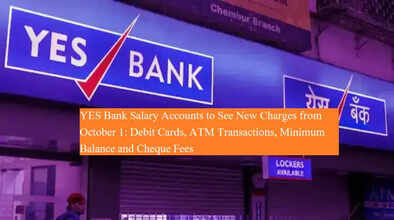YES Bank Salary Accounts to See New Charges from October 1: Debit Cards, ATM Transactions, Minimum Balance and Cheque Fees

From October 1, 2025, YES Bank will implement a new set of charges and rules for its Smart Salary accounts, covering services such as debit cards, ATM withdrawals, minimum balance penalties, and cheque transactions. These changes may increase transaction costs for account holders, particularly those who do not maintain regular salary credits or adequate balances.
Here’s a detailed breakdown of the new rules so you can understand how they may affect your banking transactions.
Debit Card Charges
YES Bank’s Smart Salary Advantage Account comes with a RuPay debit card, which carries an annual fee of ₹199.
However, for customers with Smart Salary Exclusive, Smart Salary Platinum, and Smart Salary Platinum Pro accounts, debit cards will remain free — but only if they continue to meet the account-specific eligibility criteria.
ATM Transaction Limits and Charges
ATM usage will also be affected under the revised rules.
-
For Smart Salary Advantage and Smart Salary Exclusive accounts, customers will get:
-
3 free ATM transactions per month in metro cities.
-
5 free transactions per month in non-metro cities.
-
After these limits, charges will apply:
-
₹23 per financial transaction (such as withdrawals).
-
₹10 per non-financial transaction (such as balance checks or PIN changes).
This means that frequent ATM users outside YES Bank’s own network will likely see an increase in costs.
Penalty for Not Maintaining Minimum Balance
Although salary accounts typically do not require a minimum balance, YES Bank has linked charges to salary credits and average monthly balances (AMB).
If ₹10,000 salary credit is not received in the last 3 months or ₹10,000 AMB is not maintained in the previous month, penalties will apply. The charges are based on the percentage of shortfall:
-
100% or more balance maintained: No charges.
-
Between 75% and 100% balance: 5% of the shortfall.
-
Between 50% and 75% balance: 7.5% of the shortfall.
-
50% or less balance maintained: 10% of the shortfall (maximum charge capped at ₹750).
This condition makes it critical for customers to either maintain the required balance or ensure timely salary credits.
Cheque Return and Related Charges
YES Bank has also revised cheque-related fees:
-
Insufficient funds cheque return: ₹500 for the first instance, ₹750 from the second time onwards.
-
Technical cheque return: ₹50 per instance.
-
Outward cheque return: ₹350 per cheque.
-
Standing Instruction (SI) return: ₹100 per instruction.
-
ECS return: ₹550 for the first time, ₹600 from the second instance onwards.
Additionally:
-
Cheque stop request at branch: ₹100.
-
Physical account statement: ₹100 per request.
What This Means for Customers
These changes, effective October 1, will directly impact salary account holders. Customers who regularly use non-YES Bank ATMs, issue multiple cheques, or fail to maintain adequate balances are most likely to face additional costs.
YES Bank’s decision follows a broader trend in the banking industry, where banks are revising charges to encourage digital banking and reduced branch dependency.
Final Takeaway
If your salary is credited to YES Bank Smart Salary accounts, it’s important to review these new charges before October 1.
-
Keep track of ATM usage to avoid unnecessary fees.
-
Ensure ₹10,000 salary credits or AMB to escape balance penalties.
-
Be cautious with cheque usage, as returns could become expensive.
By planning ahead and adapting to these changes, customers can minimize the impact of the new charges and continue to manage their salary accounts effectively.

